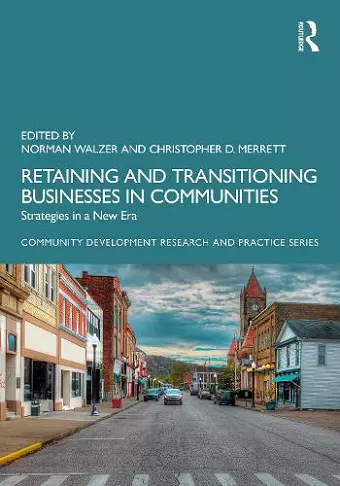Retaining and Transitioning Businesses in Communities
Strategies in a New Era
Norman Walzer editor Christopher D Merrett editor
Format:Paperback
Publisher:Taylor & Francis Ltd
Publishing:27th Jun '25
£39.99
This title is due to be published on 27th June, and will be despatched as soon as possible.

This edited collection presents successful business succession planning in smaller rural communities where profit margins are low, markets are shrinking, and there are few potential buyers. Finding innovative ways to successfully transition these businesses to new owners is at the heart of community and economic development efforts if many of these communities are to thrive in the future. Chapters outline options for successfully transitioning businesses that have worked in Canada, England, and the U.S. The book explores a variety of alternative approaches to transitioning small businesses to new owners using a different ownership model. A common theme running through these approaches is that employees and/or members of the community are engaged in working with or possibly owning the business in some cases. The book's discussions are not prescriptive, recommending specific models or strategies. Instead, they provide valuable insights into viable alternatives and suggest additional resource materials. This book is essential for academics, policymakers, and practitioners working on community and economic development issues, especially in areas with aging populations.
"One of the most critical challenges facing both rural and urban communities is the retention and transitioning of local businesses. This book is incredibly timely as it addresses these conditions in a post-pandemic world that has significantly reframed how businesses can operate, despite geography or other conditions that previously would have threatened retention and transition. In response to these unprecedented conditions, Norman Walzer and Christopher Merrett provide invaluable insights into the opportunities, challenges, critical needs, and careful considerations needed to revitalize local businesses and economies in a variety of settings. It is a must-read to help business owners, policy makers, practitioners, and others make businesses and communities stronger."
Mark Brennan, Professor of Community Development and UNESCO Chair for Community and Leadership Development, Penn State University
"With nearly 3 million business owners approaching retirement causing the largest transfer of wealth ever in the United States, this book couldn't be more timely. Retiring owners must consider alternative ownership approaches (including employee ownership) and the editors have gathered a 'who's who' of experts that provide incredibly easy to understand, yet in-depth, information on all forms of employee ownership and other alternatives to a traditional third-party sale. It is a must read for business owners, advisors, and community leaders concerned with keeping good jobs local and rewarding the employees who have helped produce the profits."
Steve Storkan, Executive Director, Employee Ownership Expansion Network
"Companies usually are owned by private individuals, or by external shareholders. However, they can be owned by their customers, employees, local communities, or other stakeholders (such as with producer co-operatives), or by some combination of these stakeholders. Such alternative, or 'mutual' ownership, is sometimes criticised as being unable to scale up, particularly globally, as easily as privately and shareholder owned companies can. This book focusses on what is good especially in rural areas and small towns. In these cases, it is a positive advantage if businesses remain relatively small scale and locally rooted. Thus, for these areas, when it comes to business succession, selling the company to its employees or customers makes perfect sense."
Jonathon Mitchie, Director, Oxford Centre on Mutual & Co-owned Business and President, Kellogg College, Oxford
"Retaining and Transitioning Businesses in Communities is an insightful, must-read exploration of how employee ownership models—ESOPs, EOTs, worker cooperatives, and community-supported enterprises—can safeguard businesses during ownership transitions. The focus on rural and smaller communities demonstrates how these strategies not only preserve local economies but also foster resilience and long-term sustainability. This timely work is a powerful resource for those passionate about building inclusive, transformative businesses that empower communities and reshape the future of ownership. An essential addition to the conversation on the power of employee ownership."
James de le Vingne, CEO, UK Employee Ownership Association
"Retiring small business owners with no family successors are selling to their workers, securing family wealth and creating a huge employee share ownership sector in the US economy. What a positive development: this is the best book to read about it."
Joseph R. Blasi, J. Robert Beyster Distinguished Professor and Director, Institute for the Study of Employee Ownership and Profit Sharing, Rutgers University
ISBN: 9781032805627
Dimensions: unknown
Weight: 453g
250 pages